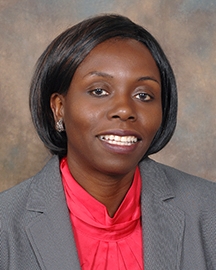Coming soon — the MS in Healthcare Data Science
We're excited to announce that our MS in Health Analytics is evolving into the MS in Healthcare Data Science, beginning in fall 2026. This represents an exciting expansion of our curriculum to meet the growing demands of the healthcare data field. Students can still apply to the MS in Health Analytics program by April 15 and begin this summer.
Faculty
Imran Khan
Faculty Director

Imran Khan currently serves as the Director and Head of Digital Health Innovation & Capabilities at AbbVie, where he is responsible for spearheading the strategy, development, and deployment of the digital technologies and capabilities needed to deliver on the vision for Digital Health of our clinical trials globally. Imran has served in different leadership roles at AbbVie for launching new drugs and supporting on-market brands in different therapeutic areas, and developing strategic capabilities in the Commercial and R&D organizations. He has a successful track record of developing innovative technology & data solutions to enable healthcare providers and patients manage advanced medication therapies for complex diseases.
Prior to joining biopharma, Imran worked for Advocate Health Care, where he led Electronic Health Records implementations, Health Information Exchanges, Patient Portals, several Interoperability projects, clinical quality improvement initiatives such as Clinical Integration, Meaningful Use, PQRS, Accountable Care Organizations, and Patient-Centered Medical Home for the largest community of hospital-affiliated physicians in the United States. In other roles, Imran worked for GE Healthcare and Walgreens, where he developed and supported several clinical and pharmaceutical applications.
Imran served on the Greater Illinois Chapter HIMSS Board of Directors for several years to advance the delivery of patient care through technology and data. Imran earned his BS in Computer Engineering from the University of Illinois, MS in Medical Informatics from Northwestern University, and an MBA from the University of Illinois at Chicago. He has over 10 years of teaching experience in the Northwestern University Health Informatics & Analytics programs.
Lynd Bacon, PhD, MBA

Lynd Bacon is a scientist and a natural philosopher. He teaches graduate and post-graduate courses in data science, machine learning, statistics, and research methods. He does research about health services delivery, product and service design, and genomic testing. His prior teaching experience includes having taught at The David Eccles School of Business at the University of Utah, Notre Dame University’s Mendoza School of Business, The University of Chicago’s Booth School of Business, Rush University, The University of Illinois at Urbana-Champaign, and the University of Illinois at Chicago. He has founded two software companies, and has held senior management and chief research officer positions in venture-funded start-up companies and in global business intelligence enterprises. Bacon has a PhD and an MA in cognitive and physiological experimental Psychology from the University of Illinois at Chicago, and an MBA with specializations in marketing, econometrics, and healthcare management from the Booth School of Business, The University of Chicago. He completed a two-year postdoctoral fellowship in neuropsychology at Rush University in Chicago, during which he did neuroscience research on healthy and patient populations, and saw patients with the clinical neurology and neurosurgery services.
Ariel Chandler

Ariel Chandler is currently a data scientist and strategic consultant at Validate Health, which provides data driven guidance to healthcare organizations on value based care contracts. In 2020 she received her PhD in Health and Biomedical Informatics from the Health Sciences Integrated Program at Northwestern University. Her dissertation work involved the application of a complex network model to electronic health record data to identify when clinical care and teamwork have the greatest impact on patient outcomes. Ariel previously worked at Boston Children’s Hospital on research integrating electronic health record and genomic data, and at The Policy and Research Group in New Orleans on projects evaluating the implementation and impact of federally funded public health programs. She earned her undergraduate degree in Cell and Molecular Biology from Tulane University.
Eytan Dallal

Eytan Dallal is a senior healthcare IT executive with over 25 years of experience in the private and public sectors, helping organizations think beyond simply using technology as a tool, and leading implementations of technology as a strategic business driver. As a former CIO in healthcare in the public and private sectors, he understands the complex nature of managing and security healthcare data across business silos and the challenges from a legal, compliance, security, privacy, and interoperability perspective.
Dallal has served as a keynote speaker and panelist in a number of seminars, recognized for his in-depth knowledge of technology, strategy, and business. He holds a Master's in Health Informatics from the College of Applied Health Sciences at the University of Illinois at Chicago, a Bachelor’s in Business Management from NEIU, and several industry certifications including HCISPP and HIPAA. He is an active member of AHIMA, HIMSS, and (ISC)2, and serves on the board of a community non-profit organization supporting education.
Christina Maimone

Christina Maimone is a data scientist with Northwestern University IT Research Computing Services, where she leads a team that supports researchers in learning data science, data visualization, and computer programming skills and applying them in their research. Through consultations, project collaborations, working groups, and workshops, her team helps thousands of researchers across the university overcome technical challenges and undertake innovative research projects. She especially enjoys projects that involve collecting new data, text analysis, and communicating effectively with data visualizations. She is active in the research computing and data professionals community, where she works to build national networks of technical research professionals and develop career paths for academic data scientists and research software engineers. Christina has a PhD in political science and a master's degree in statistics from Stanford University.
William T. Mickelson (Bill)

Dr. William T. Mickelson is an applied social science statistician and statistical consultant with over 35 years of experience in both academia and industry. Mickelson has taught across the spectrum of research and statistical topics, including courses in mathematical and stochastic modeling, general linear statistical models, response surface methods, multivariate statistical methods, and linear and non-linear optimization. He is deeply involved with statistics education and the promoting of statistical reasoning, thinking, and literacy. He has also maintained a statistical consulting practice with clients primarily in Health Care, state and local government, health and fitness, transportation, insurance, banking and finance, and Higher Education.
Ekta S. Punwani

Ekta Punwani is the Vice President, Finance & Analytics at Essentia Health. Her primary role is to guide leadership on the strategy and execution of clinical and financial analytics including decision support, operational efficiency, clinical variation and benchmarking for the organization.
Prior to joining Essentia Health, Punwani served as the Leader of the 100 Top Hospitals Program at IBM Watson Health and served in a number of positions as a Hospital and Health System executive leading organizational transformation, operations improvement, and change leadership within the health care continuum. She has demonstrated building performance improvement and analytics capability within multiple healthcare organizations including Adventist Midwest Health, Advocate Health Care and Northwestern Medicine.
Punwani provides leadership, direction, and guidance to health care organization in the areas of quality and patient safety, operations, business intelligence, and performance improvement to drive best practice implementation and achieve outcomes.
She has served on the Board of Examiners for the National Baldrige Performance Excellence Program and has received certification as an ICBB – International Certified Black Belt. Punwani received both a Bachelor of Science and a Bachelor of Arts degree from University of Illinois in Champaign-Urbana and a master’s degree in Health Administration from Washington University in St. Louis.
Danny Sama

Danny Sama is the Vice President, Information Services & Chief Data Executive for Northwestern Medicine and leads the integrated academic health system’s reporting and analytics teams in support of the strategic plan and organizational goals. He has experience in healthcare analytics in a variety of areas, including clinical/market research, hospital quality & safety, and health system strategy & planning. He earned his undergraduate degree in Management Information Systems from the University of Illinois at Urbana-Champaign and his MBA from Northwestern University’s Kellogg School of Management.
Raymond Robinson

Raymond Robinson is an Associate Professor and Co-Chair of the Department of Clinical Medicine at the American University of Antigua (AUA). His prior work in Health Informatics includes being a senior manager at the Philips Hospital to Home Telemedicine working to extend Telemedicine across the healthcare continuum. Robinson’s research interests include patient safety, healthcare quality improvement, telemedicine, data-driven decision making in Education, and student-centered teaching. He is finishing up his doctorate degree in Education from the Johns Hopkins School of Education. His doctoral thesis is titles, “Improving Student-centered Teaching Practices and Data-Driven Decision Making in Medical Faculty” and has led into developing a new adaptive learning management system to support student-centered teaching practices and to track student progress. Prior to these positions he began his medical research training working with Dr. Peter Pronovost’s team at the Johns Hopkins Quality and Safety Research Group (QSRG) on his international, On the CUSP: STOP BSI campaign. Since that time Robinson has authored several manuscripts and book chapters around healthcare quality improvement and patient safety. Robinson received his MD from the Johns Hopkins School of Medicine while also pursuing an MPH in clinical investigation, biostatistics and epidemiology at the Bloomberg School of Public Health where he completed a thesis study on “Airway Management by a Difficult Airway Response Team." Robinson then became interested in the business of healthcare and quality improvement, so took time out to pursue an MBA degree at the Johns Hopkins Carey Business School.
Victoria Wangia-Anderson

Dr. Victoria Wangia-Anderson is an Associate Professor and Program Director at the University of Cincinnati. She has a doctorate degree in Health Informatics from the University of Minnesota. She also completed the Public Health Informatics fellowship at the Centers for Disease Control and Prevention (CDC) in Atlanta, Georgia. She has a strong interest in leveraging technology and data to promote health and reduce health disparities. Wangia-Anderson has experience teaching and using health data science techniques and programming. She also has extensive experience teaching and developing courses. She has been a member of several industry organizations, including the American Medical Informatics Association (AMIA), the American Public Health Association (APHA), the Healthcare Information and Management Systems Society (HIMSS) and the American Health Information Management Association (AHIMA). In 2016, Dr. Wangia-Anderson received HIMSS fellow status, earning her the FHIMSS credential.

